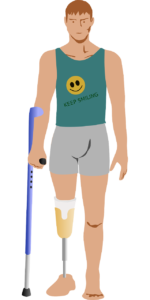The foundation of the DOC project is understanding that pain circuits are permanently laid down in your brain quickly. It is unclear in a given person when acute pain becomes chronic, but we do know that it becomes a bigger problem after 12 months (1). The brain activity switches from the nociceptive (pain) centers to the emotional areas. You still are experiencing the same pain, but there is a different driver. Once that line is crossed the “pain switch” in your nervous system is stuck “on”. Although many treatments can temporarily decrease the symptoms, most of the medical world views chronic pain as an entity to be “managed.” Modern neuroscience has shown us that this is simply not true. It is solvable.
Take charge of your brain
Regardless of the location and origin of the pain, you can retrain your brain to create alternative circuits around the old ones. It is similar to learning a new language or any other skill. As the newer, non-painful area of the brain is developed, the area causing the pain with be used less. At some tipping point, with repetition, the pain can and will disappear. There are three steps in creating these new circuits:
- Awareness
- Detachment
- Reprogramming
Mastery
The harder you try to “fix” or suppress the old pain pathways the more active they will become. Your brain will develop wherever you place your attention. If your attention is on the problem instead of the solution, you will remain stuck. You can’t learn French by trying to correct your English. This “rewiring” doesn’t require deep examination of your life, although that is helpful for other reasons. It is simply a learned skill to be mastered.
Shuhari
A friend of mine pointed out to me that in the Japanese martial arts there is the concept of “Shuhari” that describes the sequence to mastery. These concepts are from Wikipedia.
The word is really three words.
- “Shu” is “to learn”
- “Ha” is “to detach or digress”
- “Ri” implies “moving on” or “transcendence”
Mastery of your pain

“To learn” – awareness
You must first become aware of what “programs” in your head are running your life. This is true for both physical and emotional pain, as they are processed in a similar area of the brain with the result being sustained elevations of your stress hormones. Most of us don’t like pain, so we try to avoid or suppress it. You must understand and feel your pain before you can effectively create the “detours”. Otherwise you will be just running into a solid wall and bouncing from treatment to treatment.
Detach/ digress
You then have to separate from yourself to see what the options are to move forward. It is impossible to make reasonable choices if you are always reacting. It is similar to a football running back who has to see the hole in the line before he can progress up the field. I have one friend who visualizes himself sitting in a large theater. He “watches” himself on the big screen dealing with the situation in front of him. He feels like he can make better decisions. His ability to handle stress is unbelievable.
Another method to create space between you and your thoughts is expressive writing. I mention it many times in the DOC process because it is the one mandatory step to really allow change to occur. You cannot control your thoughts but you can separate from them. With the expressive writing, your thoughts are on the table and this “space” is connected to you by vision and feel. No one knows why it works so well and it has documented to be effective in over 1000 research papers. It also isn’t difficult or time-consuming.
Transcend
I have used the word reprogramming for the final step of creating new circuits. However, I like the word transcendence. It implies that not only have you moved through the obstacles you are far above them. Regaining your perspective on life is a critical step. I have often described the final phase of the DOC project as the spiritual journey. It can be manifested in an infinite number of ways and people often will thrive at level they never knew existed.
Even phantom pain can disappear
For many years, I did not understand how powerful neuroplasticity was in altering one’s reality. I knew many different pains could disappear, such as neck and back pain. I did not think that leg or arm pain could be altered and certainly not phantom limb pain. I was not only wrong, I now am convinced you can rewire your pain from any source.

Jenny was a young woman in her 20’s who had suffered a traumatic amputation of her right leg below her knee in a car accident. She developed severe phantom limb pain. Even though her leg was gone, she not only could feel the leg, but it was painful. She also had prior long-term substance abuse issues and had been suffering from neck chronic pain for many years. Her childhood was chaotic and was now in an abusive marriage with two children. Life was not treating her well,.
A couple of years ago, when the federal government mandated that physicians cut back on prescribing narcotics and her dosage was dramatically decreased. She flipped out and understandably so. She became extremely angry and aggressive with her doctors and her pain also worsened. Phantom pain is particularly problematic in that there is nothing physically that can be done for a leg that isn’t there. You can’t even rub it and is one of the reasons that is such a terrible problem.
Her doctors didn’t know what to do and she was sent to the pain center where she immediately verbally attacked her pain psychologist. He is a remarkable person and simply heard her out. Over several months, she began working with the expressive writing and relaxation tools. Medications were adjusted as needed. She understood the effect of anger on her pain and the need for forgiveness, letting go, and moving forward. Six months later she was off narcotics, had no phantom leg pain, and returned to school to become a marriage and family counselor. She wasn’t just “managing her pain” or “living the best life she could with the pain.” It was gone. Additionally, she was learning to enjoy life in a way that she had never before experienced.
The gift of mastery
Shuhari – the steps to mastery are universal. View your journey through chronic pain as a learned skill. What you probably cannot see at the moment is that when you have transcended your pain you will have been given the greatest gift that life has to offer – deep gratitude. Your appreciation of every second of life without pain is profound.
- Hashmi, JA et al. “Shape shifting pain: Chronification of back pain shifts brain representation from nociceptive to emotional circuits.” Brain(2013); 136: 2751 – 2768.
